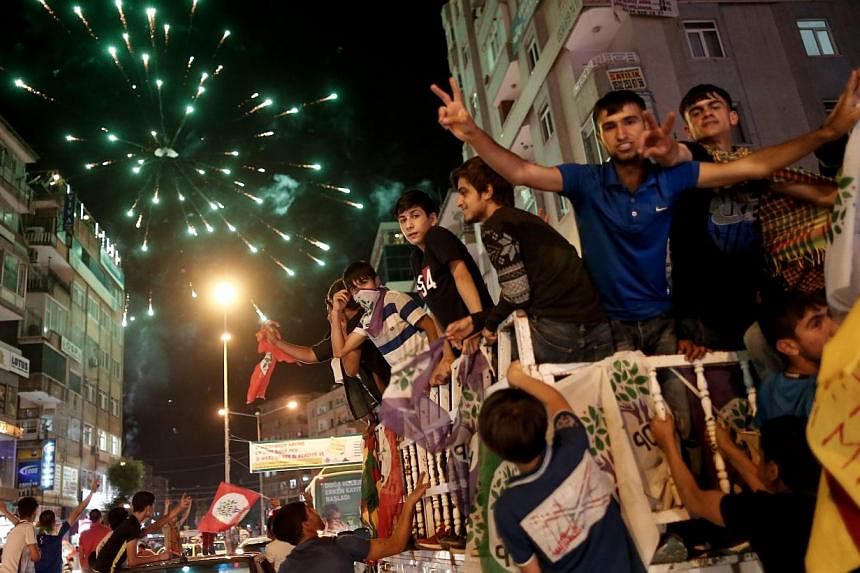ISTANBUL (AFP/BLOOMBERG) - For the first time this century, Turkey woke up the day after a general election without knowing who will form its next government.
Turkey's Islamic-rooted ruling party the Justice and Development Party (AKP) won the biggest portion of the vote in Sunday's polls for the fourth successive election, but lost the parliamentary majority it had held since 2002, delivering a severe blow to President Recep Tayyip Erdogan's ambition to expand his powers.
For the first time in its 13-year rule, the AKP must enter coalition talks or call snap elections, as Turkey's political forces weigh an unprecedented situation.
It may not be clear for weeks what scenario will unfold.
Here are some of the possible options after the poll:
AKP Minority Government
In Turkey, parties without a majority in Parliament have in the past formed minority governments. The AKP, which won 258 seats in the 550-seat Parliament, can form a minority government by procuring support from parties and groups from outside during confidence and other specific votes.
The initial hurdle for an AK Party minority government would be to win a vote of confidence, when all the other parties have campaigned on promises of driving it out of office.
But no party has voiced support for such an option yet. Mr Devlet Bahceli, the leader of the third-placed Nationalist Movement Party (MHP) has already said he would not support Erdogan's minority government from the outside.
"Nobody has a right to sentence Turkey to an AKP minority government," Mr Bahceli said. "Snap elections will happen whenever they happen."
Mr Erdogan also appeared to pour cold water on the idea, saying "no party will be able to govern alone".
AKP-MHP Coalition
Some analysts see a deal between the AKP and the nationalist MHP as the most likely scenario, but they note that it does not necessarily mean a formal coalition.
Both the AKP and the MHP appeal to similar, conservative-leaning constituencies from poorer parts of the country, but they have a number of differing policies.
The MHP strongly opposes government-led efforts to mediate a peace deal with Kurdish rebels in the south-east as well as Mr Erdogan's interventions in governmental affairs.
Mr Bahceli has shown little enthusiasm for a coalition and said that his party was ready to be a main opposition party if other parties made a deal.
AKP-Kurdish Coalition
The election's big winner was the pro-Kurdish Peoples' Democratic Party (HDP), which won seats in parliament by passing the nationwide 10 per cent threshold, needed to send MPs to Parliament, for the first time. It came in fourth place with 13 per cent following an election campaign focusing on promoting democracy, free speech and the rights of women and minorities.
But HDP leader Selahattin Demirtas ruled out any coalition with the AKP late on Sunday while votes were still being counted. He said the results had put an end to the discussion of an executive presidency championed by Mr Erdogan.
Still, the AKP has been more accommodating to the Kurdish agenda than past Turkish governments or the main opposition groups.
Other Coalition Options
The AKP and the main opposition Republican People's Party (CHP) aren't seen as likely to collaborate.
Analysts say that if all other options fail, a tripartite coalition of the second-placed CHP, MHP and HDP could be discussed, although it seems unlikely, due to the seemingly irreconcilable ideological differences between the nationalists and the Kurds - even though they could theoretically muster enough seats to govern.
Snap Elections
Should parties fail to form a coalition, the president can by law call a new election any time 45 days from now.
But Mr Numan Kurtulmus, a senior AKP official, said on Monday that a snap election was "the most unlikely" scenario, adding that his party would first try to form a coalition government.
Mr Erdogan broke the constitutional neutrality principle, which applies to the head of state, by speaking publicly in favour of the AKP party.
Analysts say that this strategy prompted a backlash from the voters, which means it is unlikely that it would work in a snap election.
"Snap elections have always been negative for Turkey and the parties that wanted it in the past ended up losing more ground," said political scientist Ali Carkoglu.

